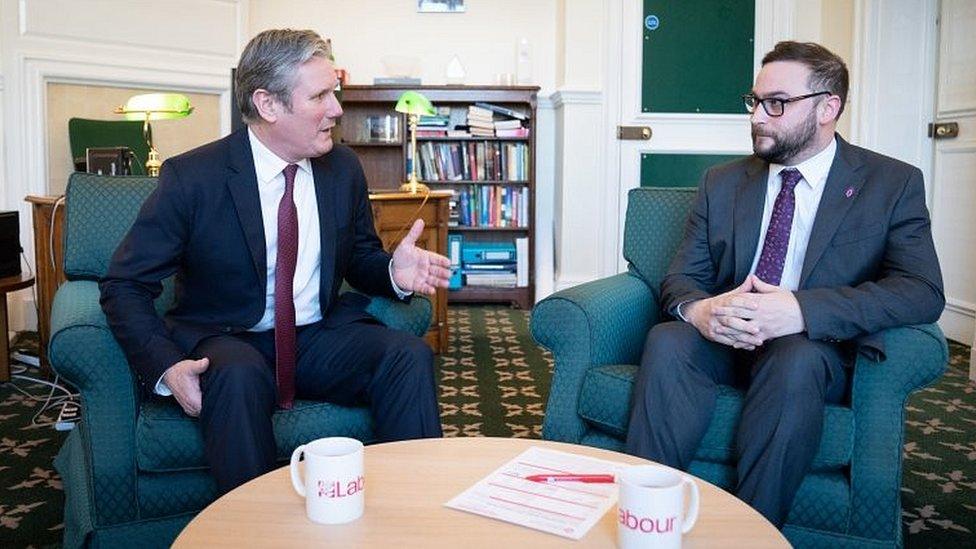Christian Wakeford's long walk to defection
- Published

Christian Wakeford had been a Conservative party member for nearly 20 years and it wasn't so-called "partygate" which provoked his defection.
The chairman of the Conservatives' Northern Research Group, Jake Berry, suggested the Bury South MP's change of political affiliation had been "hot-headed".
But, in fact, the process had taken four months, during which his discontent with his own party had simmered.
It was he who had first approached Labour four months ago, and not vice versa.
The party immediately saw his worth.
If a Conservative MP in a North of England seat could defect to Labour, perhaps voters who had gone the other way at the 2019 election could be persuaded to return to the fold.
And, as one party source put it, he would also be a "symbol" of the party's move away from the Jeremy Corbyn era.
So Labour devoted time and effort to encouraging him on his political journey.
Among other issues, Mr Wakeford had been unhappy with the withdrawal of the £20-a-week universal credit uplift, even though he hadn't opposed the decision.
He blamed voting with the government on heavy-handed attempts by whips to impose party discipline, which further disillusioned him.
Former Labour frontbencher Barry Gardiner also sensed Mr Wakeford was suffering an ideological identity crisis when they worked closely on a campaign to try to outlaw the firing and rehiring of employees.
So a Labour whip was assigned to try to shepherd him away from the Tories.
Soon he and the whip were having meetings at least once a week away from Westminster, in coffee shops and sometimes more obscure venues.
He was sent details of party policies that might appeal to him by WhatsApp.
Slim majority
Meanwhile, I'm told the Bury South MP was also lobbying his fellow Conservatives on issues such as the cost of living. But a meeting with Chancellor Rishi Sunak apparently didn't go well.
With a majority of barely more than 400, he was worried that the seat may not be held unless he convinced constituents he was bringing home the goods.
So he edged closer to Sir Keir Starmer's party.
Contact was suspended over Christmas and New Year while he thought over the implications of his defection.
Party and personal relationships might be ruptured, but by the start of the year, it was a question of when not if he'd make the political leap.
Some things had helped him on his way - not least the Owen Paterson affair - and the re-application of the government whips' thumbscrews when he was identified as someone who'd send a letter of no confidence in the prime minister.
He was also irritated by Conservative claims that freezing the BBC licence fee would help with the cost of living, which he saw as a much larger issue.
But mentally, he was already leaving behind his old party, which he had joined as a student.
Christian Wakeford said he had "many sleepless nights" over his decision to defect to Labour
The deal was sealed after he met Sir Keir on Monday night.
Some shadow ministers told me they had had no whiff of his intentions until Tuesday night, so the operation was conducted well under the political radar.
The effect of Mr Wakeford's defection was probably to bolster Conservative Party unity and at least temporarily pause the rebellion in its ranks.
But Labour did not want its prize to be overshadowed by Sue Gray's report into gatherings in Downing Street - now expected next week - and any the party would not want to give Conservative rebels pause for thought after it comes out.
Some of Mr Wakeford's Conservative colleagues accused him of betrayal.
The 2019 intake, who met twice this week to discuss Mr Johnson's future, do not want to be tainted by association with him and were keen to point out he did not attend their gatherings at which letters of no confidence were discussed.
And there are plenty of politicians who would suggest Mr Wakeford's move was motivated by self-preservation, and the calculation that he could not hold the highly marginal seat if he campaigned in Conservative colours.

Labour has been courting Christian Wakeford for several months
But what kind of party is joining? He was welcomed by the chairman of his local constituency Labour Party, but that is not to say all the activists will follow suit.
His use of offensive language to describe Labour opponents in the past hasn't exactly been universally welcomed.
The Young Labour group has accused him of voting against the interests of working-class people.
And he has already made an enemy of the left-wing group Momentum, which has called for a by-election in Bury South - a fate Mr Wakeford previously advocated for defectors.
Labour sources said no more defections were imminent.
But they are having "informal conversations" with a small number of Conservatives who are currently unhappy.
How Mr Wakeford is treated by his new colleagues might determine whether he is ultimately joined by any members of his former party.